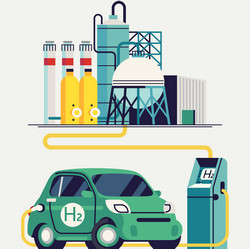Better sensors promote hydrogen use
Europe’s low-carbon energy policy means greater use of fuel cells and technologies based around the use of hydrogen as a fuel. However, their competitiveness depends directly on their safety and the safety of the facilities where they are used. Therefore, hydrogen sensors are a crucial enabling technology for the safe use of hydrogen. The sensors can be used to trigger alarms and activate ventilation or shut down systems to prevent hydrogen reaching flammable levels. The H2SENSE(opens in new window) (Cost-effective and reliable hydrogen sensors for facilitating the safe use of hydrogen) project promoted hydrogen primarily, but not exclusively, for its use as an alternative fuel. It brought together different stakeholders including, sensor manufacturers, end-users, certification bodies and independent evaluators to ensure the optimum use of low-cost and reliable hydrogen sensors. Project partners analysed sensor performance in real-life applications in industrial environments and identified increased requirements for sensors and for regulations, codes and standards. H2SENSE also facilitated the safe use and implementation of hydrogen as an alternative fuel by ensuring the correct use of effective hydrogen detection devices. European scientists worked together with colleagues from the National Renewable Energy Laboratory at the US Department in Colorado, USA. They pooled their knowledge of developments in hydrogen sensor technology as well as deployment and commercialisation strategies. These benefits will be continued through trans-Atlantic inter-laboratory sensor testing programmes in which EU and US laboratories perform complementary tests and exchange results. H2SENSE will support the safe use of hydrogen and the transition to a hydrogen economy, by minimising the release of the gas into the atmosphere. By identifying and overcoming barriers to sensor development and innovation, the project will promote small and medium-sized enterprises and a stronger market for hydrogen sensors, resulting in the creation of jobs. The project will also increase links between research and industry and EU and US research establishments.







